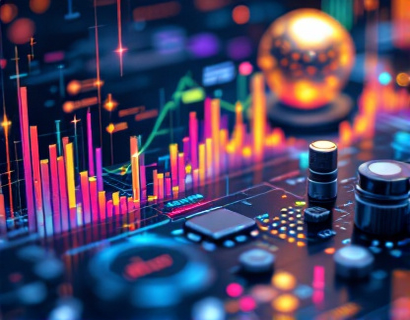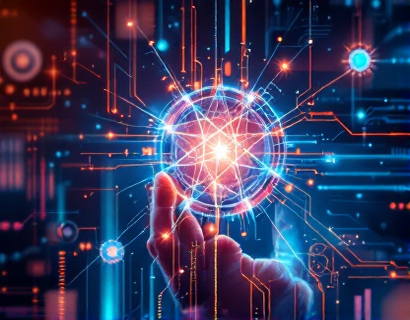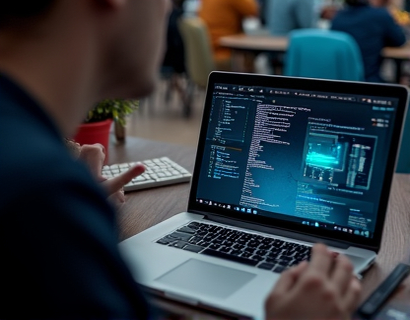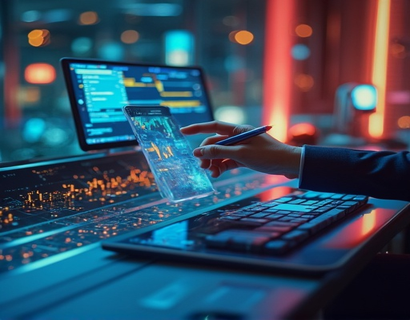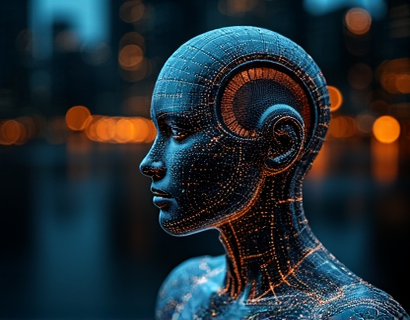Crypto and AI: Transforming Digital Engagement in the Modern Ecosystem
The integration of cryptocurrency and artificial intelligence (AI) is revolutionizing the digital landscape, creating a new paradigm for user engagement and interaction. This transformation is not just about technological advancements but also about redefining how we connect, transact, and experience digital services. The convergence of these two powerful technologies is giving rise to innovative solutions that are reshaping the tech ecosystem, enhancing user experiences, and driving unprecedented growth and connectivity.
The foundation of this transformation lies in the unique properties of blockchain technology, which underpins cryptocurrency. Blockchain's decentralized, transparent, and secure nature provides a robust framework for building trust and ensuring integrity in digital interactions. When combined with AI, which excels in pattern recognition, predictive analytics, and automation, the potential for creating seamless and intelligent digital experiences becomes immense.
Enhancing Security and Trust
One of the most significant impacts of merging crypto and AI is the enhancement of security and trust in digital platforms. AI algorithms can analyze vast amounts of data to detect anomalies and potential security threats in real-time. This proactive approach to security is crucial in a world where cyber threats are becoming increasingly sophisticated. By integrating AI-driven security measures with the immutable nature of blockchain, platforms can offer unparalleled protection for user data and transactions.
For instance, AI-powered systems can monitor blockchain networks for unusual activity, such as unusual transaction patterns or attempts at smart contract manipulation. These systems can automatically trigger alerts and take corrective actions, ensuring that the network remains secure and reliable. This level of security is essential for building user trust, which is a critical factor in the adoption and success of any digital platform.
Personalized User Experiences
AI's ability to process and analyze large datasets allows for the creation of highly personalized user experiences. In the context of cryptocurrency and digital services, this means tailoring recommendations, notifications, and interactions based on individual user behavior and preferences. For example, a digital wallet app powered by AI can learn a user's spending habits and suggest optimal times for transactions to minimize fees or recommend new services based on past usage.
Personalization extends beyond just user interfaces. AI can optimize the underlying infrastructure of digital platforms, ensuring that resources are allocated efficiently to meet user demands. This not only enhances the user experience but also improves the overall performance and scalability of the platform. By leveraging AI to understand and predict user needs, platforms can offer a more intuitive and user-friendly experience, fostering greater engagement and loyalty.
Smart Contracts and Automated Processes
Smart contracts, a key feature of blockchain technology, are being enhanced by AI to create more sophisticated and autonomous processes. Traditional smart contracts are pre-programmed to execute specific actions when certain conditions are met. However, AI can add a layer of intelligence that allows these contracts to adapt and learn from new data, making them more flexible and responsive.
For instance, in the realm of decentralized finance (DeFi), AI-enhanced smart contracts can dynamically adjust interest rates, credit limits, and other parameters based on real-time market conditions and user behavior. This not only streamlines financial processes but also reduces the need for intermediaries, lowering costs and increasing efficiency. The combination of smart contracts and AI is paving the way for more autonomous and trustless systems, where users can interact directly without the need for traditional financial institutions.
Fraud Detection and Prevention
Fraud remains a significant challenge in the digital world, particularly in the realm of cryptocurrency transactions. AI algorithms are proving to be invaluable tools in detecting and preventing fraudulent activities. By analyzing transaction patterns, user behavior, and historical data, AI can identify potential fraud with high accuracy and speed.
For example, AI systems can detect unusual spikes in transaction volumes, suspicious wallet activities, or attempts to manipulate prices in decentralized exchanges. These systems can automatically flag suspicious activities for review or even take immediate action to prevent fraud. This proactive approach to fraud detection not only protects users but also enhances the overall integrity of the digital ecosystem.
Enhancing Decentralized Applications (DApps)
Decentralized applications (DApps) are at the forefront of the crypto and AI revolution, offering users decentralized and autonomous services. AI is playing a crucial role in improving the functionality and user experience of DApps. By integrating AI components, DApps can provide more intelligent and responsive features, such as predictive analytics, natural language processing, and advanced data visualization.
For instance, a decentralized trading platform can use AI to analyze market trends, provide real-time insights, and suggest optimal trading strategies. This not only enhances the user experience but also increases the platform's value and attractiveness to users. AI-driven DApps are set to redefine the way we interact with digital services, making them more intuitive, efficient, and user-centric.
Optimizing Supply Chain and Logistics
The supply chain and logistics industry is another area where the combination of crypto and AI is making a significant impact. By leveraging blockchain for transparent and secure tracking, and AI for predictive analytics and optimization, businesses can achieve greater efficiency and reliability in their operations.
AI can analyze data from various sources, such as sensors and IoT devices, to predict demand, optimize routes, and reduce costs. When combined with blockchain, this data can be recorded in a tamper-proof manner, ensuring transparency and accountability throughout the supply chain. This not only improves operational efficiency but also builds trust among all stakeholders involved.
For example, a logistics company can use AI to predict delivery times and optimize routes in real-time, while blockchain ensures that all transactions and movements are recorded securely and transparently. This integration not only enhances the customer experience but also reduces the risk of errors and fraud, leading to cost savings and increased customer satisfaction.
Challenges and Considerations
While the potential benefits of merging crypto and AI are vast, there are several challenges and considerations that need to be addressed. One of the primary concerns is the regulatory landscape. The intersection of cryptocurrency and AI falls into a gray area where existing regulations may not fully apply. This requires a collaborative effort between regulators, technologists, and industry stakeholders to create clear and fair guidelines that foster innovation while protecting users and the public interest.
Another challenge is the technical complexity involved in integrating these technologies. Developing robust and scalable solutions that can handle the demands of large-scale applications requires significant expertise and resources. Additionally, ensuring interoperability between different blockchain platforms and AI systems is crucial for widespread adoption.
Privacy is also a critical concern. While AI can enhance security and personalization, it also raises questions about data privacy and the ethical use of user information. It is essential to implement strong privacy measures and transparent data handling practices to maintain user trust and comply with regulations such as GDPR.
Future Prospects
The future of crypto and AI is bright, with numerous opportunities for innovation and growth. As technology continues to advance, we can expect to see even more sophisticated applications that further blur the lines between the physical and digital worlds. The integration of AI with other emerging technologies, such as the Internet of Things (IoT) and quantum computing, will open up new possibilities for enhancing digital engagement and creating more intelligent and connected ecosystems.
For developers and businesses, the key to success will be embracing a user-centric approach, focusing on building solutions that genuinely add value to users' lives. By prioritizing security, privacy, and ethical considerations, the tech community can ensure that the benefits of crypto and AI are realized in a responsible and sustainable manner.
In conclusion, the merging of cryptocurrency and AI is transforming the digital landscape, offering unprecedented opportunities for enhancing user experiences, driving growth, and fostering connectivity. As these technologies continue to evolve, their impact on the tech ecosystem will only become more profound, shaping the future of digital engagement in ways we are only beginning to imagine.




